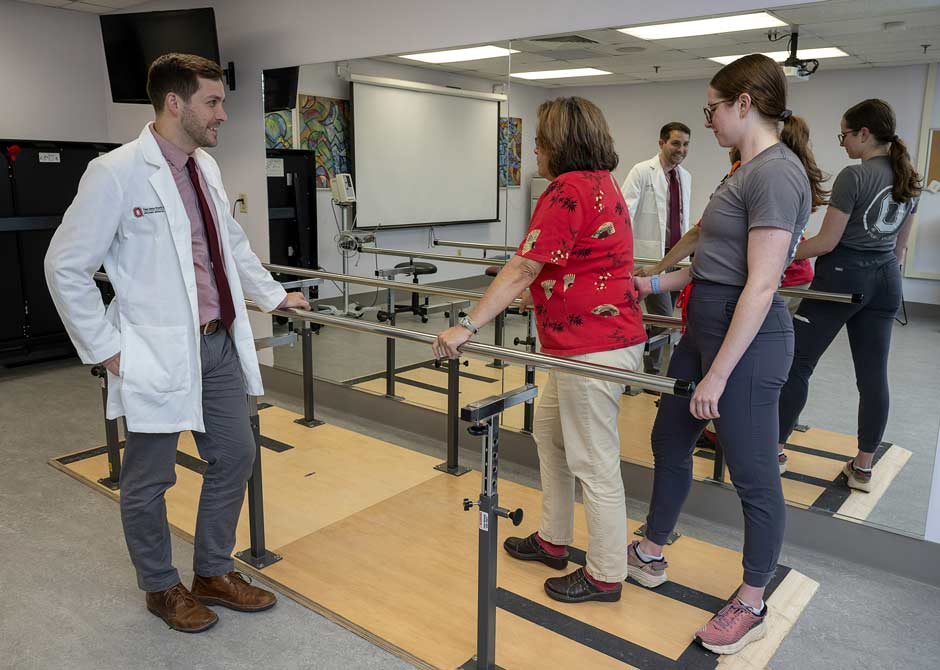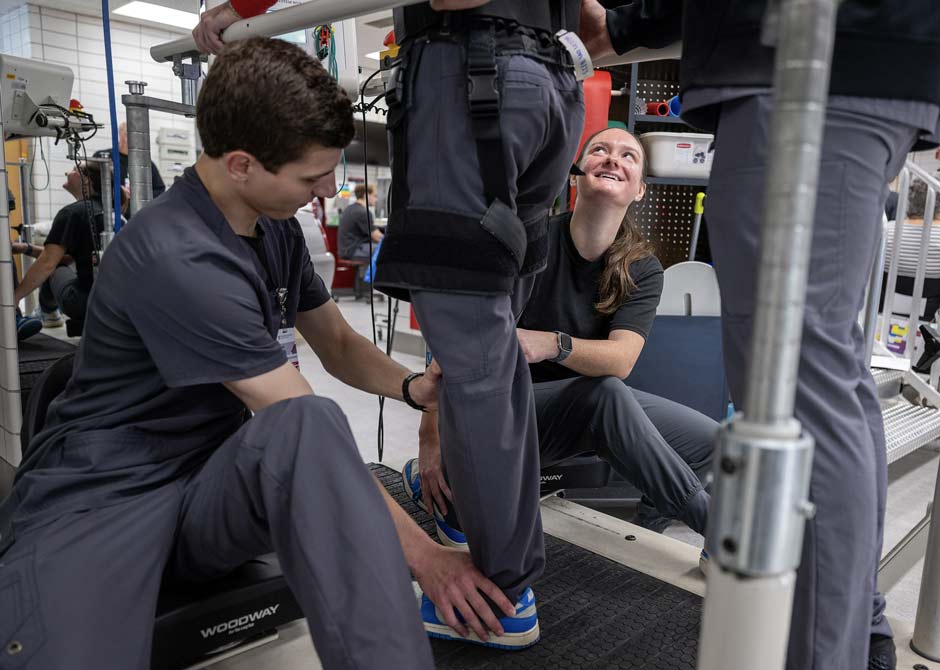 Neurological diseases and disorders can be life-changing and challenging for you and your family to manage.
Neurological diseases and disorders can be life-changing and challenging for you and your family to manage.
At The Ohio State University Wexner Medical Center in Columbus, Ohio, our neurologists collaborate with the physical medicine and rehabilitation team because we know physical therapy and other rehabilitation services are important components to effectively managing these types of conditions. With the support of clinical rehabilitation professionals here, you can often regain abilities and improve your quality of life.
Whether your neurological issue requires an inpatient stay at our award-winning Dodd Rehabilitation Hospital or can be treated in outpatient offices close to home, we want to partner with you in your care.
What is neurological rehabilitation?
Neurological rehabilitation provides comprehensive and targeted therapy services to people with mobility or speech difficulties due to trauma or disease in the nervous system.
Our goal is to address your specific needs and goals with a personalized treatment plan designed to improve your mobility, cognitive function and overall quality of life. We offer physical, occupational and speech therapy, as well as other techniques and tools, on an inpatient basis during a stay at Dodd Hospital, or on a weekly or semi-weekly basis in therapy offices located conveniently throughout central Ohio.
This specialized type of rehabilitation is performed by therapists and clinicians with special training and certifications in working with people with neurological conditions.
What conditions can be treated with neurological rehabilitation?
Our experienced rehabilitation team treats people with a variety of neurological conditions. That means we have expertise in managing a wide range of symptoms with varying severity levels.
Conditions we regularly treat in neurological rehabilitation include:
- Amyotrophic lateral sclerosis (ALS)
- Brain injury (traumatic and nontraumatic)
- Cerebral palsy
- Cognition and memory disorders
- Dysphagia
- Guillain-Barre syndrome
- Huntington’s disease
- Multiple sclerosis (MS)
- Muscular dystrophy
- Neuropathy
- Parkinson’s disease
- Post-concussion syndrome
- Spinal cord injury
- Stroke
- Transverse myelitis
- Vestibular (balance) disorders
What services are included in neurological rehabilitation?
 Our therapies that are based on the latest techniques and best practices, over years of clinical experience, can help minimize your symptoms and, in some cases, return you to a high level of functionality.
Our therapies that are based on the latest techniques and best practices, over years of clinical experience, can help minimize your symptoms and, in some cases, return you to a high level of functionality.
Additionally, we treat the whole person: your social, emotional and vocational needs are addressed to improve your overall well-being and independence.
You’re first evaluated and assessed to determine your needs and set goals. A customized treatment plan is then developed to work toward meeting those objectives. Your neurological rehabilitation plan may include therapies to manage:
- Balance
- Behavioral and social skills
- Bowel and bladder issues
- Cognition
- Depression and anxiety
- Mobility and transfers
- Nutritional counseling
- Reintegration into life roles
- Self-care and daily living activities
- Speech and communication skills
- Swallowing
- Vocational counseling
- Wheelchair training and skills
State-of-the-art equipment available at our facilities includes:
- SafeGait® system
- ZeroG® system
- Functional electrical stimulation (FES)
- Ergometers and eXcite® NMES systems
- Therapy pools
- Bertec Vision Advantage®
- Driving simulator
- Locomotor training
- Ekso Indego® exoskeleton
- Bioness®
- Computerized vestibular assessments
These are just a sampling of what we have to offer in neuro rehab, and we’re constantly innovating to provide the latest technology to serve you.
What specialty neuro-rehabilitation programs are available at Ohio State?
We have a variety of specialty programs dedicated to the care of people with neurological disorders. These programs include:
Brain Injury Rehabilitation
Our Brain Injury Rehabilitation Program provides comprehensive services and support to maximize your physical, cognitive and psychological recovery and to restore your quality of life following a brain injury.
Spinal Cord Injury Rehabilitation
With the latest treatments, therapies, technology and groundbreaking research, our nationally known Spinal Cord Injury Rehabilitation Program is led by a team determined to help you reach your fullest potential.
Assistive technology
Assistive technology generally refers to any device, product or system that helps people with disabilities maintain or improve function to be able to complete everyday tasks, work, go to school and participate in favorite activities.
Wheelchair services
With a personalized assessment from experts at the Wheelchair Seating and Mobility Clinic, people can access a customized chair that fits their needs, condition and abilities, improving their comfort and quality of life.
Driving rehabilitation
Driving rehabilitation is designed to help people with medical, physical, visual or cognitive difficulties learn or regain the skills necessary for safe, independent driving.
Vestibular (balance) rehabilitation
Vestibular therapy can provide balance retraining and teach you exercises to cope with dizziness and vertigo in your daily life.
Rehabilitation psychology
Rehabilitation psychology is a specialized field of mental health care that focuses on how people recover and adapt following a significant illness, injury or disability.
Why choose Ohio State for neuro rehab?
Ohio State’s comprehensive rehabilitation programs help people with serious neurological conditions optimize their abilities and achieve a higher level of independence. Reasons they choose Ohio State include:
- Personalized care – You’ll receive a personal evaluation that helps create an individualized care plan to meet your needs and improve your overall health. We teach you the skills and techniques needed to help you in work, home and social settings.
- Accredited programs – Our outpatient rehabilitation programs, as well as our inpatient rehabilitation program at Dodd Rehabilitation Hospital, are accredited by the Commission on Accreditation of Rehabilitation Facilities (CARF). CARF recognizes our programs as meeting the highest standards in quality, safety and outcomes.
- Comprehensive services – Ohio State is home to one of only five centers nationally that are part of the NeuroRecovery Network. This network uses activity-based therapies, specifically locomotor training that uses the nervous system’s ability to learn or relearn motor skills. We’re the only central Ohio program that provides the full spectrum of care for spinal cord injuries.
- Better outcomes – Our treatment plans address the unique physical, social, psychological, emotional and economic issues that often accompany serious neurological conditions. This comprehensive approach allows you to return to your community sooner than most programs, as our inpatient length of stay is shorter than the national average.
- A national leader – Our rehabilitation program consistently ranks among the best in the nation. As an academic medical center, we offer the most advanced technologies and treatment techniques, and innovative care backed by research.
- Unparalleled expertise – Our multidisciplinary team of highly skilled rehabilitation professionals focuses on your specific needs. Your rehab team may include physiatrists, orthopedists, physical therapists, exercise physiologists, occupational therapists, speech-language pathologists, neuropsychologists, recreational therapists, audiologists, social workers and vocational counselors.
